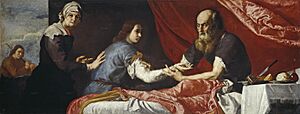Isaac and Jacob facts for kids
Isaac and Jacob is a famous painting by the artist Jusepe de Ribera. He painted it in 1637 using oil paints on a canvas. This artwork has been kept at the Prado Museum in Madrid, Spain, since 1918. It shows an important story from the Bible.
Contents
Journey of the Painting
We don't know who first asked Ribera to paint Isaac and Jacob. It was part of the Royal Collections in Spain. In 1734, the painting was in the Royal Alcázar of Madrid. This was a big palace.
A fire happened at the palace that year. The painting had to be moved to safety. After the fire, it went to the Royal Palace. It stayed there for many years. Later, it moved to the San Fernando Academy. Finally, in 1854, it found its home at the Prado Museum.
The Story in the Painting
This painting shows a story from the Book of Genesis in the Bible (chapter 27, verses 1-29). It's about a trick! Isaac, who was blind, had two sons: Esau and Jacob. Isaac wanted to give his special blessing to his older son, Esau.
But Jacob, with help from his mother Rebekah, decided to trick his father. Jacob covered his arm with a sheepskin. This made his arm feel hairy, like Esau's. He pretended to be Esau to get the blessing instead.
What You See in the Art
Ribera shows the characters from the waist up. Isaac is lying on a bed. He is reaching out to feel Jacob's arm. Jacob is sitting on the bed. His mother, Rebekah, stands nearby. She looks like she is encouraging Jacob to continue the trick.
On the left side of the painting, you can see Esau. He is returning from hunting. He doesn't know what is happening inside.
Ribera's Painting Style
Many art experts believe this is one of Ribera's best paintings. He makes the scene look like a play on a stage. Ribera uses amazing colors and bright light. This makes you feel like you are right there. You can almost touch the objects in the painting. The artist makes the sheepskin and other fabrics look very real. The faces of the people also look incredibly natural.
Look closely at the right side of the painting. There are objects like a still life. Ribera didn't paint many still lifes. But this part of the painting was very important. It inspired other artists who painted similar scenes later.
The painting was likely meant to be seen from below. Maybe it was placed above a door or a window. This is why the view point is low. The painting is also tall and narrow.
See also
 In Spanish: Isaac y Jacob (Ribera) para niños
In Spanish: Isaac y Jacob (Ribera) para niños
 | Georgia Louise Harris Brown |
 | Julian Abele |
 | Norma Merrick Sklarek |
 | William Sidney Pittman |


